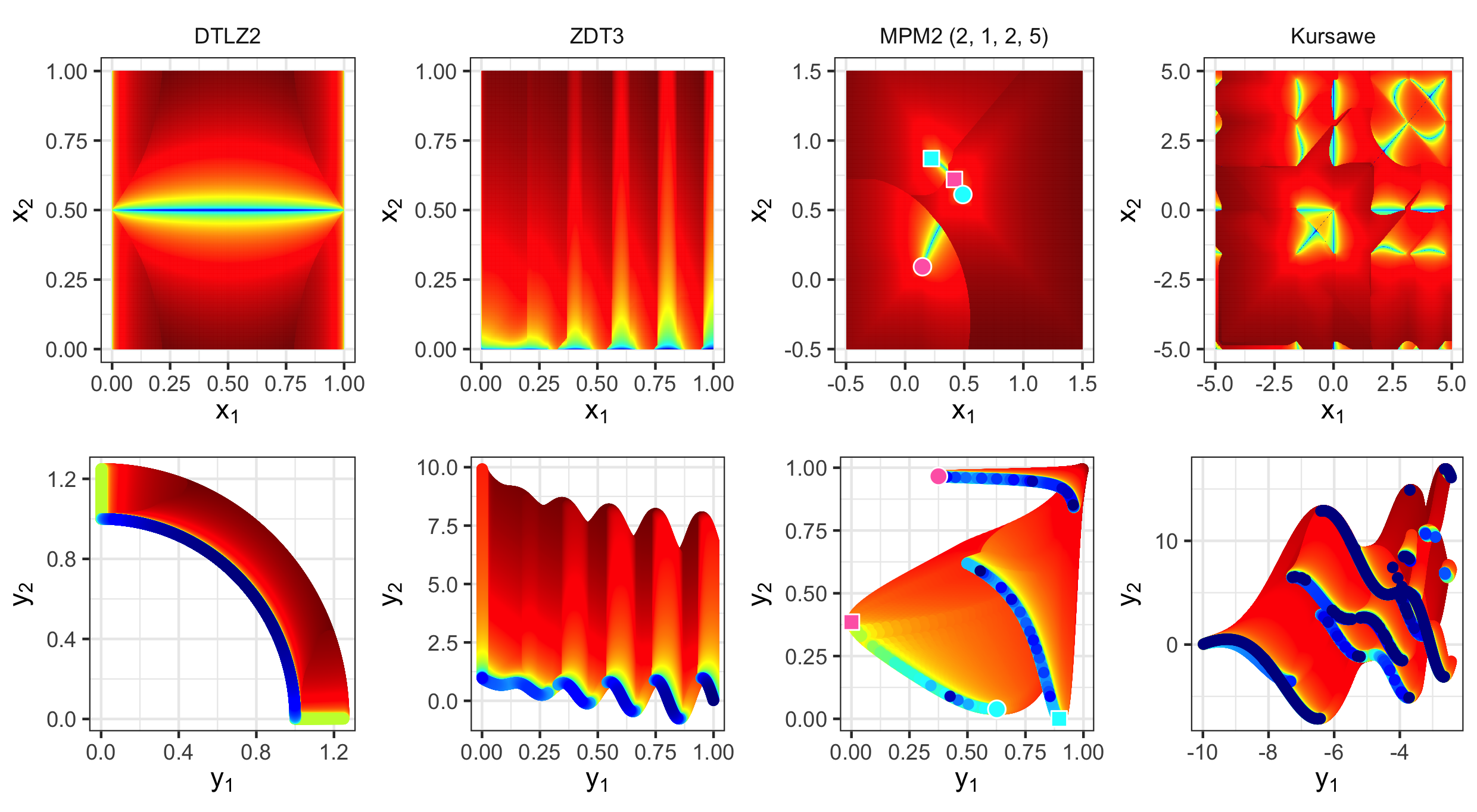README.md
In kerschke/mogsa: A Multi-Objective Optimization Algorithm Based on Multi-Objective Gradients
mogsa: Visualizing and Optimizing Multi-Objective Optimization Problems
Description
Although many (real-world) optimization problems actually contain multiple objectives and
hence actually are multi-objective optimization problems, people often prefer to handle
them as single-objective problems (as those are easier to grasp).
In an attempt to make multi-objective problems more conceivable, mogsa provides the
means to visualize the landscapes of bi-objective problems -- more precisely: of its
gradients. As exemplarily shown by the heatmaps below, the visualizations reveal the
interactions between the local optima of the problem's different objectives in the
search and decision space.

Based on the insights gained from these visualizations, we developed a multi-objective
gradient-based local search algorithm: the multi-objective gradient
sliding algorithm (MOGSA), which is also implemented within this package.
Installation
Currently, mogsa is only available within this development version, however, we of
course also plan to submit it to CRAN in the near future.
In the mean time, feel free to use the development version of this package:
install.packages("devtools")
devtools::install_github("kerschke/mogsa")
Quickstart
To be continued ...
Citation
If you like our proposed gradient-field heatmaps, cite our EMO 2017 paper in your publications. Similarly, please refer to our EMO 2019 paper when referencing MOGSA.
@inproceedings{KerschkeGrimme2017Expedition,
author = {Pascal Kerschke and Christian Grimme},
title = {{An Expedition to Multimodal Multi-Objective Optimization Landscapes}},
booktitle = {{Proceedings of the 9$^{th}$ International Conference on Evolutionary Multi-Criterion Optimization (EMO)}},
pages = {329~--~343},
series = {{Lecture Notes in Computer Science (LNCS)}},
volume = {11411},
editor = {Heike Trautmann and G{\"u}nter Rudolph and Kathrin Klamroth and Oliver Sch{\"u}tze and Margaret Wiecek and Yaochu Jin and Christian Grimme},
year = {2017},
publisher = {Springer},
address = {M{\"u}nster, Germany},
isbn = {978-3-319-54157-0},
doi = {10.1007/978-3-319-54157-0_23},
url = {http://link.springer.com/chapter/10.1007/978-3-319-54157-0_23}
}
@inproceedings{GrimmeKerschkeTrautmann2019Multimodality,
author = {Christian Grimme and Pascal Kerschke and Heike Trautmann},
title = {{Multimodality in Multi-Objective Optimization --- More Boon than Bane?}},
booktitle = {{Proceedings of the 10$^{th}$ International Conference on Evolutionary Multi-Criterion Optimization (EMO)}},
pages = {126~--~138},
series = {{Lecture Notes in Computer Science (LNCS)}},
volume = {11411},
editor = {Kalyanmoy Deb and Erik Goodman and Carlos A. {Coello Coello} and Kathrin Klamroth and Kaisa Miettinen and Sanaz Mostaghim and Patrick Reed},
year = {2019},
publisher = {Springer},
location = {{East Lansing}, {MI}, {USA}},
doi = {10.1007/978-3-030-12598-1_11},
url = {https://link.springer.com/chapter/10.1007/978-3-030-12598-1_11}
}
Contact
If you have any suggestions or ideas, or run into problems while running the code, please
use the issue tracker or send me an e-mail (kerschke@uni-muenster.de).
kerschke/mogsa documentation built on July 11, 2019, 11:52 p.m.
mogsa: Visualizing and Optimizing Multi-Objective Optimization Problems
Description
Although many (real-world) optimization problems actually contain multiple objectives and hence actually are multi-objective optimization problems, people often prefer to handle them as single-objective problems (as those are easier to grasp).
In an attempt to make multi-objective problems more conceivable, mogsa provides the means to visualize the landscapes of bi-objective problems -- more precisely: of its gradients. As exemplarily shown by the heatmaps below, the visualizations reveal the interactions between the local optima of the problem's different objectives in the search and decision space.

Based on the insights gained from these visualizations, we developed a multi-objective gradient-based local search algorithm: the multi-objective gradient sliding algorithm (MOGSA), which is also implemented within this package.
Installation
Currently, mogsa is only available within this development version, however, we of course also plan to submit it to CRAN in the near future.
In the mean time, feel free to use the development version of this package:
install.packages("devtools")
devtools::install_github("kerschke/mogsa")
Quickstart
To be continued ...
Citation
If you like our proposed gradient-field heatmaps, cite our EMO 2017 paper in your publications. Similarly, please refer to our EMO 2019 paper when referencing MOGSA.
@inproceedings{KerschkeGrimme2017Expedition,
author = {Pascal Kerschke and Christian Grimme},
title = {{An Expedition to Multimodal Multi-Objective Optimization Landscapes}},
booktitle = {{Proceedings of the 9$^{th}$ International Conference on Evolutionary Multi-Criterion Optimization (EMO)}},
pages = {329~--~343},
series = {{Lecture Notes in Computer Science (LNCS)}},
volume = {11411},
editor = {Heike Trautmann and G{\"u}nter Rudolph and Kathrin Klamroth and Oliver Sch{\"u}tze and Margaret Wiecek and Yaochu Jin and Christian Grimme},
year = {2017},
publisher = {Springer},
address = {M{\"u}nster, Germany},
isbn = {978-3-319-54157-0},
doi = {10.1007/978-3-319-54157-0_23},
url = {http://link.springer.com/chapter/10.1007/978-3-319-54157-0_23}
}
@inproceedings{GrimmeKerschkeTrautmann2019Multimodality,
author = {Christian Grimme and Pascal Kerschke and Heike Trautmann},
title = {{Multimodality in Multi-Objective Optimization --- More Boon than Bane?}},
booktitle = {{Proceedings of the 10$^{th}$ International Conference on Evolutionary Multi-Criterion Optimization (EMO)}},
pages = {126~--~138},
series = {{Lecture Notes in Computer Science (LNCS)}},
volume = {11411},
editor = {Kalyanmoy Deb and Erik Goodman and Carlos A. {Coello Coello} and Kathrin Klamroth and Kaisa Miettinen and Sanaz Mostaghim and Patrick Reed},
year = {2019},
publisher = {Springer},
location = {{East Lansing}, {MI}, {USA}},
doi = {10.1007/978-3-030-12598-1_11},
url = {https://link.springer.com/chapter/10.1007/978-3-030-12598-1_11}
}
Contact
If you have any suggestions or ideas, or run into problems while running the code, please use the issue tracker or send me an e-mail (kerschke@uni-muenster.de).
Add the following code to your website.
For more information on customizing the embed code, read Embedding Snippets.
